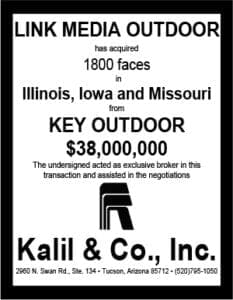 A lease may be binding even if both parties haven’t signed it. That’s the surprising conclusion of Rode Oil Company v Outdoor Communications, Inc. Here are the facts.
A lease may be binding even if both parties haven’t signed it. That’s the surprising conclusion of Rode Oil Company v Outdoor Communications, Inc. Here are the facts.
- In June 1995 Rode Oil Company signed a lease with Outdoor Communications. The lease began: “RODE OIL CO. INC. as Lessor hereby leases to OUTDOOR COMMUNICATIONS, INC., Lessee the premises…for an original term of 10 years beginning upon construction at a yearly rental of $2,400, payable in MONTHLY installments…”
- In June 1995 Rode Oil and Outdoor Communications identified and marked a location for the billboard on the property.
- Outdoor Communications did not sign the lease but applied and received permits for the billboard from the state of Tennessee and city of Jackson in August 1995. In August Outdoor Communications ordered a billboard structure for the site.
- In August 1995 a competing out of home company offered to lease the site from Rode Oil at a higher rent. On August 29, 1995 Rode Oil sent a letter to Outdoor Communications saying that it was terminating the lease: “Our company executed a purported lease for an outdoor advertising structure in June of this year. It is now nearly September and you have yet to start construction of an outdoor advertising structure, we’ve heard nothing from you and have yet to receive any rent…I am advised that this lease amounts to no more than an option to lease and is, therefore, if not void, voidable by either party…Therefore, let this letter serve as our notic to you of our termination…”
- In September 1995 Outdoor Communications signed and returned the lease to Rode Oil and installed a billboard.
- Rode Oil filed a declaratory judgement saying that it had not sign a lease with OCI but made an offer which was freely revocable prior to OCI’s acceptance. OCI counterclaimed that Rode had breached its agreement.
- Although a trial court ruled that the document signed by Rode Oil was a revocable offer, in September 2008 a Tennessee Court of Appeals disagreed for the following reasons: (1) The document Rode signed was a lease, not an offer to lease. (2) By marking the billboard location, ordering permits and ordering steel, OCI was acting as if the offer was accepted. “Notwithstanding the failure of OCI to sign the lease, any reasonable observor of these actions would have concluded that OCI had accepted Rode Oil’s offer and that OCI was acting under the agreement. Moreover, the actions of which Rode Oil had knowledge would have reasonably indicated this.”
Billboard Insider’s take: This dispute might have been avoided if OCI had promptly signed and returned the lease. Even though the lease was not signed by both parties, the Appeals court used actions to conclude the parties acted as if the lease were binding.
To receive a free morning newsletter with each day’s Billboard insider articles email info@billboardinsider.com with the word “Subscribe” in the title. Our newsletter is free and we don’t sell our subscriber list.
Paid Advertisement

















